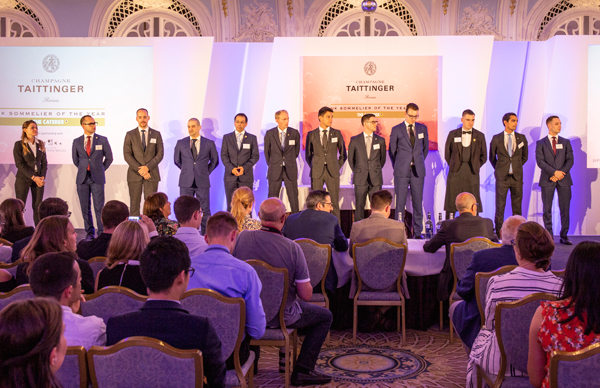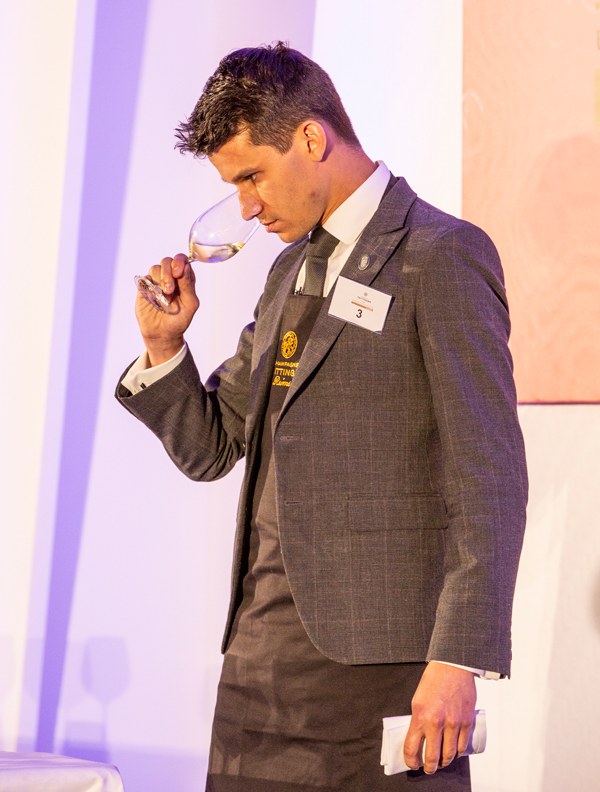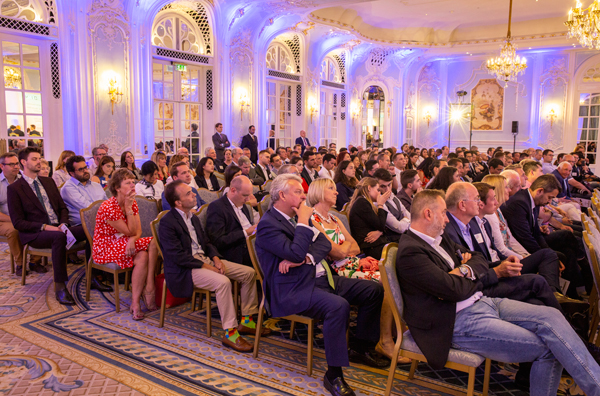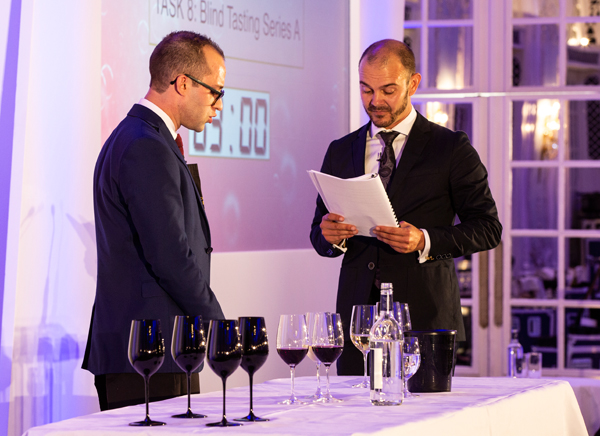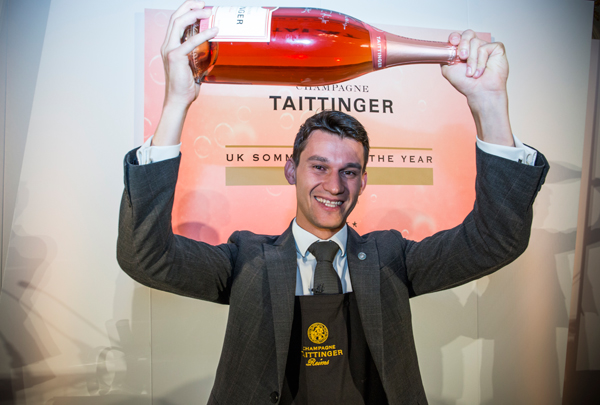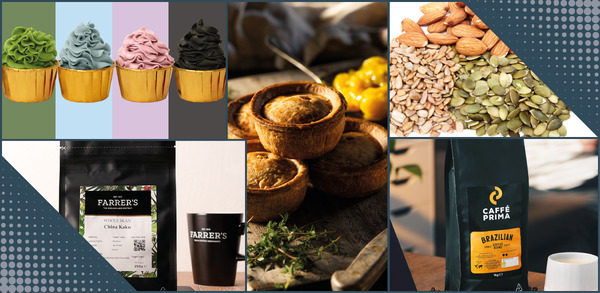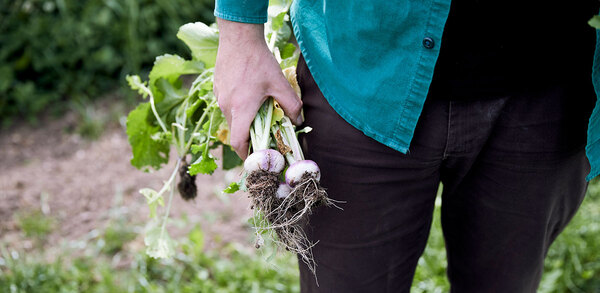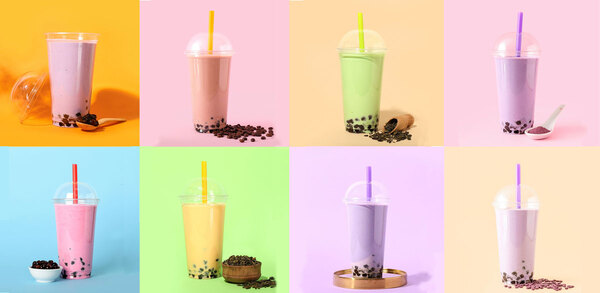Alexandre the Great: meet the 2018 Sommelier of the Year
"I never thought that watching a blind tasting could be so exciting," whispered a guest behind me at the UK Sommelier of the Year competition, held at London's Savoy Hotel last week.
Finalist Alex Freguin has just done a complete about-turn; there is a collective gasp from the 300-strong audience as he boldly declares to the judges that the three wines in front of him are from Piedmont, not the Loire as he first stated.
This is as difficult as it gets in the countryâs toughest sommelier competition, run by The Caterer in partnership with the Academy of Food and Wine Service, and now in its 39th year. The winner gets to enter the European Sommelier of the Year competition, and ultimately, the Worldâs Best Sommelier â" nirvana for your ambitious sommelier.
The competitors put in a great many hours of preparation before the competition, a fair few returning after having competed in previous years. After scoring at least 75% on a questionnaire, the competitors went through to the regional finals, where they had to complete a written paper and a blind tasting among other tasks.
Twelve competitors were selected to compete on the day of the final at the Savoy, which involved completing a series of tricky tasks set by head judge Gerard Basset: another blind tasting, a written knowledge test, and a âsnappy scenarioâ. And then there were six: Tamas Czinki (Northcote), Pierre Brunelli (LâEnclume), Gareth Ferreira (Core by Clare Smyth), Alex Freguin (Moor Hall), Mikael Grou (Alain Ducasse at the Dorchester) and Rudy Le Metayer (Summer Lodge).
And after yet another round of testing and tasting behind closed doors, three finalists were announced in front of a live audience in the Savoyâs gilt-edged River Room â" Brunelli, Czinki and Freguin had all made it through.
The judges include some of the best sommeliers in the business, many of them past winners, who scrutinise the contestants under deputy head judge Nicolas Clercâs watchful eye. This came after Peter Hancock, Pride of Britain Hotelsâ chief executive and the competitionâs master of ceremonies, launched the event with his trademark witty banter, doing his best to defuse the palpable tension.
The first task is correcting errors on a wine list, something you may think comes easily to sommeliers at this level. However many finalists get so focused on one particular âpageâ that they fail to spot the wines are listed as white, when they are all in fact reds â" and most audience members missed it too.
But all finalists get that German producer Dr Bürklin-Wolf is located in the Pfalz, not the Rheinhessen as displayed, and that Greek grape Agioritiko is a red wine, not a white, and that 1977 DâOliviera Madeira is not made with Torrontés as written, but with Terrantez.
Behind the sommeliers is a table filled with an array of glasses, each one holding a different wine. The blind tasting session that follows is an eye-opener to say the least, and we listen as each sommelier runs through the reasoning behind each wine they taste, offering a full organoleptic description on one, a commercial description (as if in front of diners) on another, and a simple identification on the third, before identifying the uniting region, with just nine minutes for the lot. The sommeliers leap from the Loire, to Burgundy, to Piedmont, as they nose, slurp and then try and nail the wines in front of the judges.
The final element to the blind tasting is identifying four different spirits in four black glasses. Their responses vary widely as the three finalists jump from Cognac to single malt whisky, from tequila to rum, proving just how tricky it is to work out what you are drinking when you canât see what youâre tasting â" all in the spotlight. And itâs almost as nervy for the audience, who gaze on as the seconds slip away.
The tension ratchets up even further with the scenario segment. This is where deputy head judge Clerc issues a brief to each finalist in a mock restaurant set-up, where the judges play diners firing off a list of demands, which contestants respond to as they would in their own restaurants.
But thereâs some confusion surrounding the first task. The finalists are asked to decant a bottle of Château Phélan-Ségur, St Estephe, which the âdinersâ have brought with them. The âhostâ also asks the contestant to serve a bottle of Gevrey-Chambertin, but the finalists all suggest serving the latter first, while they wait for him to decant the former â" but this is met with a firm no from âhostâ judge Gearoid Devaney, who insists that they serve both wines together. None of the finalists complete the task in the allotted time.
âMaybe the timing on this task was a bit strict,â admits Clerc later. âWe were hoping for less talking and more speed from the candidates. But this is a competition and we need to keep it at a certain level each year. We are also expected to bring in a few changes each year so we can keep challenging the candidates,â he explains.
However the finalists make up for the setback in the second part of the restaurant scenario, where they must come up with some food and wine matching suggestions for a theoretical lunch party for 50 on a limited budget, with âthe chefâ (judge Roger Jones) who is sitting with âthe guestsâ running through his globally inspired menu.
It prompts some inspiring pairings, including Brunelliâs suggestion of Umathum Zweigelt with salt marsh lamb, Czinkiâs South African Chenin Blanc Semillon Cartology blend from Alheit with the tempura lobster, and Freguinâs English Chardonnay from Gusbourne for the scallop and beurre blanc. Freguin also veers creatively off piste with a suggestion of a Somerset cider brandy digestif, followed by a low-caffeine coffee from Ethiopia, winning him extra points from the judges.
âI think youâll agree that this task was a particular challenge, especially as the âdinner guestsâ seemed to have received some bad news recently,â quips Hancock at the end of the segment, after an attempt at humour from Freguin (the first and only attempt in the final), which gets a laugh from the audience although it doesnât succeed in cracking a smile on the faces of the judges, who keep up their steely demeanour.
The last task on the day is the Champagne pour, which finalists approach with a mixture of relief after the long, tiring day, while guests start salivating at the thought of a chilled glass of Taittinger waiting for them in the reception room upstairs.
Finally the candidates and guests are asked to leave the room as the judges are left to their deliberations, before returning a little later, vinously refreshed, to hear who will walk away with the top prize.
Clerc takes to the stage to introduce each of the finalists, who cling onto each other amicably still wearing their service aprons, before announcing the winner with an excruciating X Factor-style delay.
Alexandre â" Alex â" Freguin punches their air at his triumph, and continues pumping his fists, grinning all the way to the podium as Rihannaâs âDiamonds in the Skyâ fills the room, while Czinki smiles graciously when he hears that he won second place. âMy goal was to go as far as I could with this, but I did that and more, so for me itâs a fantastic personal achievement,â says Freguin, still grinning. Shining bright, indeed.
The finalists Melania Battiston, head sommelier, 28°-50° Wine Workshop & Kitchen, London
Markus Berlinghof, head sommelier, the Clove Club, London
Daniele Di Blasio, sommelier, Trishna, London
Pierre Brunelli, beverage manager, LâEnclume, Cartmel, Cumbria
Tamas Czinki, head sommelier, Northcote, Langho, Lancashire
Gareth Ferreira, head sommelier, Core by Clare Smyth, London
Alexandre Freguin, head sommelier, Moor Hall Restaurant with Rooms, Ormskirk
Mikael Grou, assistant head sommelier, Alain Ducasse at the Dorchester, London
Martin Jezek, senior sommelier, Dinner by Heston Blumenthal, London
Rudy Le Metayer, sommelier, Summer Lodge, Evershot, Dorset
Matteo Montone, head sommelier, The London Edition
Paul Robineau, sommelier, Hide, London
What the finalists said Pierre Brunelli, beverage manager, LâEnclume, Cumbria
âThis is my first time in the final six and itâs an eye-opener. Even if I donât get to the final three, then itâs all about refining the mechanisms for next time. The most important thing is to learn something from this, especially if you fail. If you fail, you get better next time. Itâs a competition with yourself really. For me, the tasting was a bit more challenging than I thought it would be, as were the snap questions, which you canât really prepare for.â
Gareth Ferreira, head sommelier, â¨Core by Clare Smyth, London
âThis is my third time in the final, but I keep on doing it because I keep on getting better at it, and it becomes a bit like a drug in that respect. It makes you think outside the box. The trickiest part for me is being put on the spot and having to deal with it. These competitions are very much about what happens on the day, a bit like penalties in a football match â" itâs not always the best team that wins the shoot-outs. That said, the person who ends up winning this absolutely deserves it, as they got through it without making any major mistakes.â
Tamas Czinki, head sommelier, â¨Northcote, Lancashire
âThis is my fourth time in the final, so itâs been a long journey for me. Every year is different. Why put myself through it? Itâs an amazing opportunity, from meeting different sommeliers to having that kind of experience under pressure. Yes, itâs hard to find time to practise but there are things you can do to prepare yourself mentally, even act out certain scenarios. The hardest part of this competition changes every year but the pressure is always there. My hot tip? Do a bit of meditation beforehand â" imagine yourself in the situation. When it comes to the restaurant scenario, then just imagine you are in your own restaurant, trying to make everyone happy.â
Paul Robineau, sommelier, â¨Hide, London
âIâve never done a sommelier competition before. Up until fairly recently I was working on my grandfatherâs wine estate in the Loire, before moving to England to work as a sommelier at the Fat Duck, and now Hide, where I am one of 17 sommeliers â" the largest team in the UK, if not Europe. I didnât quite realise just how well prepared you need to be for this. But Iâll come back stronger next year. The scenario segment was the hardest bit for me; you need a lot of confidence and a lot of practice, but I found it all very exciting. Itâs important to test yourself.â
What the judges said about the winner, Alex Freguin
Xavier Rousset (winner 2002)
âAlex showed strength and consistency in most tasks. He is a very talented taster, too. He proved to be very mature on stage despite this being his first time in the final.â
Liora Levi, Association of International Sommeliers and Norwegian Sommelier Association
âOnly having seen Alexandreâs performance in the final, I was impressed by his blind tasting skills, the level of knowledge about wine in general and the way he approached the different tasks. He has a natural and very pleasant way of behaving around his guests. He is a sommelier I would like to be served by, as well as a sommelier I would employ.â
Jan Konetzki (winner 2012)
âIt was a hard day with a lot of points for details that had to be carefully added up, but it was a tight race with brilliant performances. Alex showed an array of skills during the competition, which in the end elevated him to win. I was especially impressed by how much he trusted his gut feeling â" when he changed the conclusion in the blind tasting on stage. â¨He took a chance and came out a winner.â
Nicolas Clerc, deputy head judge â¨(winner 2007)
âHe was the cleverest of the three and thatâs what made the difference. Alex spotted the most errors on the wine list. His level of knowledge was just that bit higher than the others. Plus, he was charming, especially in his food and wine pairing. He was efficient in his decanting. And he absolutely nailed the tasting â" that was what swung it for us. He changed his mind halfway through and just went for it, realising that the third wine was a Barolo, and from that concluded that the other two were Gavi di Gavi and Dolcetto, which can both be difficult to spot. At this level you need a bit of luck, but you also need to take a risk â" and it paid off. Weâve got the right winner.â
Gerard Basset, head judge (winner â¨1989 and 1992)
âIt was a great final with three wonderful finalists. Alexandre performed better on the day, showing great blind tasting skills and overall a more superior organisation than his two colleagues in the different practical tasks. Alexandre is a superb and worthy winner, but the other two finalists can look ahead to next year with confidence and optimism from the experience they have gained during the final.â
Roger Jones, chef-owner, the Harrow â¨at Little Bedwyn, Wiltshire
âAlex was an excellent, young, impressive candidate. I was especially impressed with the task where he had to match wines to the menu that I designed. He was cool and collected, knowledgeable on both new world and old world wines and presented himself in a friendly but professional manner. His depth of knowledge was excellent and he must have put a huge effort into gaining â¨such expertise at such a young age. It was a pleasure to see him win the competition.â
The Champagne pour
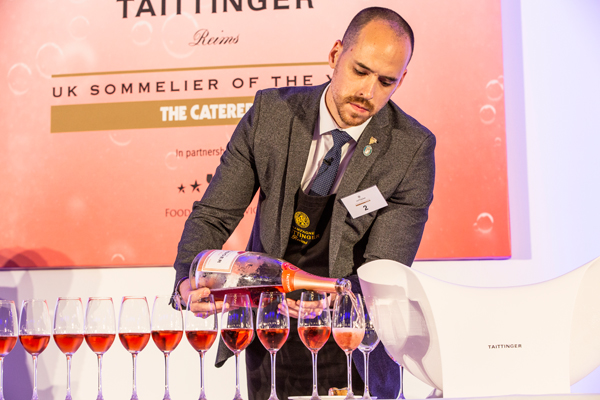
Thereâs no returning to a glass, and each competitor bobs up and down frantically to check the levels as the glasses are poured, before putting the bottle â" ideally empty and within the allotted time â" back in the ice bucket.
This year, Taittinger stepped forward to do the honours, providing its stellar Brut Prestige Rosé NV for the finalists to work with. So what does it taste like? Think aromas of wild strawberries and a hint of spice. Think lively fresh fruit on the palate with lingering aromas of crushed wild raspberries, cherry and blackcurrant.
While it certainly makes the perfect summer aperitif, itâs also great paired with a range of food, from crispy duck salad to red-fruit based desserts, thanks to the significant addition of Pinot Noir in the blend, made from grapes picked from vineyards in Ambonnay, Bouzy and Les Riceys; while Chardonnay makes up the other significant component in the blend, sourced from a number of crus in the Marne and the Aube, with Pinot Meunier completing the picture.
Itâs worth pointing out that Taittinger uses its own grapes, making the family-owned Champagne house, with a heritage that dates back to the 1700s, the second largest domaine owner in the region â" not all grower Champagnes come in small packages, it seems.
The company philosophy actively encourages young chefs by hosting its very own prestigious culinary prize, the Taittinger Prix Culinaire, which has been running for 52 years, making it the oldest culinary competition in Europe; and now Taittinger is nurturing sommeliers, too, thanks to its support for this yearâs UK Sommelier of the Year competition, bringing it even closer to the hospitality industry.
The champion:Alexandre Freguin, head sommelier, Moor Hall, Lancashire
Provence-born Freguin, 29, is the head sommelier at one-Michelin-starred Moor Hall in Lancashire. This is the second time he has reached the finals of the UK Sommelier of the Year. Last year, he made it into the top six; this year he won, taking the title away from his fellow finalists, Tamas Czinki and Pierre Brunelli, who were placed second and third respectively.
So what made him enter in the first place? âItâs always good to have a goal â" and I just wanted to see what was going on. Iâve always been competitive, so I thought, why not? Even if you lose, you learn a lot about yourself. If you push yourself to another level you become better, itâs as simple as that,â he shrugs.
That said, Freguin trained hard, passing his advanced level in the Court of Master Sommelier exams back in January, with the intention of going all the way to Master Sommelier. âI did a lot of theory. I also spent time in many vineyards. If you really want to understand wine then you need to understand whatâs happening in the vineyard,â he says.
What was the hardest part of the competition? âThe waiting,â he grimaces. âYou need to be mentally prepared for this. You need to be focused, take things task by task and understand clearly what the judges are asking of you. If you lose focus, then you are finished.â
Freguin says it helped that he stopped studying for the competition a month before, to begin preparing himself mentally, and he indeed appeared to be the calmest competitor on stage. âYou need to take risks, without being too crazy. You need to be confident,â he advises. âBut I think that each of us can achieve great things if you are passionate about something, and â¨Iâm passionate about wine.â
So law didnât do it for him, then? âNo,â he laughs. âBut while I was at university in Aix, I became friends with a guy whose family owned a vineyard and we would hang out there all the time. I loved the atmosphere, and I was very curious about what was going on.â
After dropping out of law school, he enrolled in the Ecole Hôtelière de Provence, but was more interested in the work experience than the classes, enjoying his time working at one-Michelin-starred Pierre Reboul in Aix-en-Provence, where the passion displayed by the sommelier rubbed off. In 2011, he moved to Lyon as sommelier of Restaurant Eskis, then to Les Loges as head sommelier. Then, in 2014, he upped sticks to the UK to work as a sommelier at LâEnclume in Cumbria, followed by the move to Moor Hall in 2016.
âIt was always my goal to work in the UK. You have the most dynamic chefs here, with so many influences, and diners who are really open-minded. The same goes for wine lists in the UK, with selections drawn from all over the world. Itâs about the quality of whatâs in the bottle, whether itâs Slovenian or South African, and if itâs the best match for the food. I love that. Thereâs so much freedom and flexibility here,â he enthuses.
Message from Nicolas Clerc, deputy head judge
The Taittinger Sommelier of the Year competition is the ultimate test of a sommelierâs skills and knowledge. Those who reach the final 12 are among the elite practitioners of wine service and, regardless of the result, all should be celebrated for their commitment and bravery.
On the day of the finals, the competitors are put through a series of tough tasks designed to test their palate, wine knowledge and appreciation, communication and service skills, and their ability to perform under pressure. It really is the most comprehensive test of a sommelierâs ability. We have documented the challenges in the following pages. Itâs this exacting blend of exercises that makes winning the competition such a massive achievement.
The final three competitors were particularly impressive, but the eventual winner â" Alex Freguin from Moor Hall â" was the most complete and consistent, displaying particularly impressive poise and knowledge in front of our high-profile audience. Thanks to the generosity of our friends at Taittinger and all our other sponsors, Alex will enjoy a package of mentoring, learning and tools that will stand him in good stead as his career develops.
Alex now takes his place among a list of past winners that reads as a roll-call of the countryâs greatest exponents of wine service. His success makes him an exemplar, someone whose achievements other sommeliers can aspire to.
Iâd like to offer my thanks to Taittinger and all our other sponsors for supporting this important competition.
We look forward to receiving your nominations for the 2019 Taittinger UK Sommelier of the Year competition.
Do you know someone brilliant in the hotel industry? Entries are open for the Hotel Cateys!



